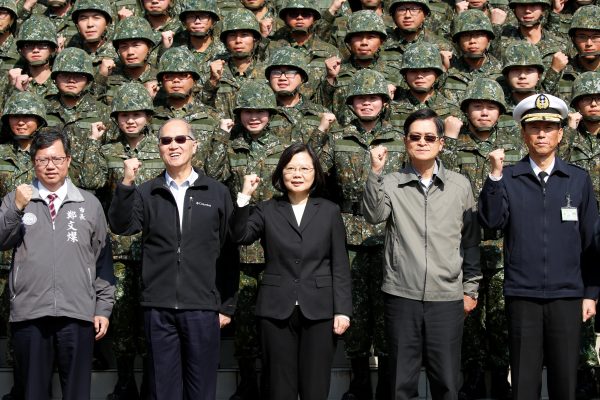Well-intentioned but inaccurate predictions of an imminent war over Taiwan are not new. US Navy admiral Phillip Davidson recently warned of an invasion within the next six years. But as China expert Bonnie Glaser points out, the United States’ defence-driven assessment of a Taiwan Strait war fails to take into account China’s overall interests in the region.
By renewing the guidelines for a ‘peaceful united front’ (he tong), suppressing advocates for reunification by force and emphasising the ‘connection, incentives and affection’ (tong, hiu, qing) approach, Beijing remains confident that its developmental advantage will induce Taiwan to inevitably accept reunification. Invading Taiwan would likely escalate into a China–US war, for which China is currently at a disadvantage. China’s strategy to subdue Taiwan and isolate it from the global community is more sophisticated than just taking military action.
The global community can strengthen Taiwan’s comprehensive security through pragmatic action and multi-level cooperation. For instance, along with arms sales, US officials should grant Taiwan access to first-hand intelligence about the People’s Liberation Army’s (PLA) movements, which is arguably more crucial than sending US troops to aid Taiwan in an actual war.
Further, signing a substantial trade agreement is less risky than dispatching flashy delegations — a planned visit by the former US ambassador to the United Nations reportedly almost ignited aerial combat with PLA forces. The PLA warned that it would not only follow the US delegation’s plane into Taiwan’s airspace, but also open fire if Taiwanese jets attempted to block them, forcing the United States to cancel the politically provocative visit.
Given the Biden administration is inclined to maintain the US policy of ‘strategic ambiguity’, it is reasonable for other nations like Japan to avoid making public commitments regarding Taiwan’s security. While the United States has linked Taiwan’s security to its own prestige and power, most other countries care more about continued access to the growing Chinese market than the fate of an island perilously close to China. For instance, Germany’s frigate in the Indo-Pacific has avoided sailing through the Taiwan Strait. And according to the German Chamber of Commerce in China, 72 per cent of German companies in China plan to make further investments in 2021.
Meanwhile, supply chain issues such as the semiconductor chip shortage have reminded the world that safeguarding Taiwan means more than just standing up for democracy. Since it is very difficult to dilute Taiwan’s influence over high-tech supply chains, a pragmatic approach for other countries is doing more business with Taiwan. This could mean investing in Taiwan’s transformative tech industries, and integrating Taiwanese capital into multinational investment plans such as the Blue Dot Network or the emerging EU–India global infrastructure deal. Taiwanese companies scaling back from China could provide the finance and experience to boost the Asian economy.
Practicing the concept of ‘geoeconomic deterrence’ or forming an ‘economic NATO’ could further strengthen Taiwan’s defence. By further integrating Taiwan’s economy with the rest of the world, the costs grow higher for China to deal with Taiwan with force, and the punching power of China’s economic coercion diminishes.
While cybersecurity, public health and Mandarin education are other potential domains of cooperation with Taiwan, a less developed field is global partnership on China and Taiwan studies. Due to language barriers and the scarcity of public information, it is difficult for most foreigners to grasp the subtle but significant dynamics between the two Chinese-speaking polities. Taiwan’s geographical and cultural proximity could fill this gap.
For example, though the State Council Office for Taiwan Affairs is in theory the designated authority for cross-strait relations, it has receded influence on Taiwan policy to other institutions such as the National Society of Taiwan Studies, the Ministry of State Security and the Chinese Communist Party’s Central Propaganda Department. Bureaucratic competition can result in incoherent policies, so distinguishing which actions better reflect Beijing’s true intentions is crucial. Such information can only come from those with long-time experience observing cross-strait relations. Exchanging expertise through media, academics, think tanks and political risk consultancies between Taiwan and other countries will become increasingly important.
When it comes to Taiwan’s security, we have to look beyond the military dimension. Without heightening war rhetoric, the risk of bloodshed in the Taiwan Strait can be reduced by establishing substantial and multi-level global connections with Taiwan. Only when the last Chinese-speaking democracy is resilient enough to gradually mend political differences with China through negotiation, will a peaceful resolution of the cross-strait problem be more likely.
Nicholas Chiu is a political and cross-strait affairs researcher based in Taipei.


Quiet action is no longer popular for politicians especially in the English speaking countries.
Politicians in those countries with self-interest in mind will make incendiary statements to inflame the ROC vs PRC situation because it is a popular and low cost route to popularity to bash PRC because any fighting happen will be around ROC and PRC.
Politicians in the ROC will also be able to take advantage of anti PRC sentiment, by engineering diplomatic set-backs or vaccine difficulties that are able to be blamed on the PRC and this is also a sure win manner to consolidate their vote bank.
Your idea is great but I don’t think we will see politicians abandoning the incendiary statements in favor of the quiet and time consuming acts to strengthen economic networks.